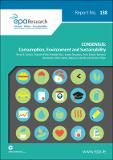| dc.contributor.author | Davies, Anna R. | |
| dc.contributor.author | Fahy, Frances | |
| dc.contributor.author | Rau, Henrike | |
| dc.contributor.author | Devaney, Laura | |
| dc.contributor.author | Doyle, Ruth | |
| dc.contributor.author | Heisserer, Barabara | |
| dc.contributor.author | Hynes, Michael | |
| dc.contributor.author | Lavelle, Mary Jo | |
| dc.contributor.author | Pape, Jessica | |
| dc.date.accessioned | 2015-11-16T12:47:26Z | |
| dc.date.available | 2015-11-16T12:47:26Z | |
| dc.date.issued | 2015 | |
| dc.identifier.citation | Davies, A.D., Fahy, F., Rau, H., Devaney, L., Doyle, R., Heisser, B., Hynes, M., Lavelle, M.J. and Pape, J. (2015) ConsEnSus: Consumption, Environment and Sustainability. EPA Ireland, . | en_IE |
| dc.identifier.issn | 978-1-84095-561-3 | |
| dc.identifier.uri | http://hdl.handle.net/10379/5330 | |
| dc.description.abstract | Sustainable consumption is generally conceived as the use of goods and services that respond to basic needs and bring a better quality of life, while minimising the use of natural resources, toxic materials, and emissions of waste and pollutants over the life cycle, so as not to jeopardise the needs of future generations. It is recognised internationally that achieving sustainable consumption represents a major challenge for public authorities (at all levels), businesses and consumers as it requires economic and social as well as environmental sustainability. In particular, patterns of household consumption are recognised as contributing significantly to global unsustainability yet understanding of that consumption is under-developed in many sectors. In response, the CONSENSUS research project conducted foundational and exploratory research to establish the parameters of debates and actions within the field internationally and across Ireland. The first phase reviewed existing policy, international good practice and tools for governing sustainable consumption. It was found that Ireland faces a number of key challenges in terms of good governance of sustainable consumption. These include the lack of a coherent policy framework for sustainable consumption; split responsibility for sustainable consumption across government departments; weakly developed consumer policy; and underdeveloped multistakeholder collaboration in sustainable consumption discussions. Recommendations include: the formulation of interventions for sustainable lifestyles from a consumer perspective; more attention to the particularities of the political-institutional context that influences an area of consumption; awareness-raising among consumers of the material consequences of consumption; the combining of regulatory instruments; and the development of tailor-made policy strategies to address the challenge of sustainable consumption. | en_IE |
| dc.language.iso | en | en_IE |
| dc.publisher | EPA Ireland | en_IE |
| dc.rights | Attribution-NonCommercial-NoDerivs 3.0 Ireland | |
| dc.rights.uri | https://creativecommons.org/licenses/by-nc-nd/3.0/ie/ | |
| dc.subject | Consumption | en_IE |
| dc.subject | Environment | en_IE |
| dc.subject | Sustainability | en_IE |
| dc.title | ConsEnSus: consumption, environment and sustainability | en_IE |
| dc.type | Report | en_IE |
| dc.date.updated | 2015-11-06T14:38:17Z | |
| dc.local.publishedsource | http://www.consensus.ie/wp/wp-content/uploads/2015/07/EPA-Research-138-final-for-web1.pdf | en_IE |
| dc.description.peer-reviewed | non-peer-reviewed | en_IE |
| dc.contributor.funder | |~|1267871|~| | en_IE |
| dc.internal.rssid | 9136912 | |
| dc.local.contact | Michael Hynes, Room 323, 2nd Floor, School Of Political Science & So, Áras Moyola, Nui Galway. Email: mike.hynes@nuigalway.ie | |
| dc.local.copyrightchecked | No | |
| dc.local.version | PUBLISHED | |
| nui.item.downloads | 2205 | |


